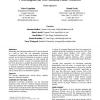Free Online Productivity Tools
i2Speak
i2Symbol
i2OCR
iTex2Img
iWeb2Print
iWeb2Shot
i2Type
iPdf2Split
iPdf2Merge
i2Bopomofo
i2Arabic
i2Style
i2Image
i2PDF
iLatex2Rtf
Sci2ools
73
Voted
CHI
2003
ACM
2003
ACM
Post-cognitivist HCI: second-wave theories
Historically, the dominant paradigm in HCI, when it appeared as a field in early 80s, was information processing ("cognitivist") psychology. In recent decades, as the focus of research moved beyond information processing to include how the use of technology emerges in social, cultural and organizational contexts, a variety of conceptual frameworks have been proposed as candidate theoretical foundations for "second-wave" HCI and CSCW. The purpose of this panel is to articulate similarities and differences between some of the leading "post-cognitivist" theoretical perspectives: language/ action, activity theory, and distributed cognition. Keywords HCI theories, language/action, activity theory, cognitive approach, distributed cognition OVERVIEW OF THE PANEL TOPIC Information processing psychology was the theoretical foundation of the "first-wave" Human-Computer Interaction (HCI). The limitations of this paradigm were demonstrated in seminal books ...
Candidate Theoretical Foundations | CHI 2003 | Human Computer Interaction | Keywords HCI Theories | Mainstream Hci Community |
| Added | 01 Dec 2009 |
| Updated | 01 Dec 2009 |
| Type | Conference |
| Year | 2003 |
| Where | CHI |
| Authors | Bonnie A. Nardi, Edwin Hutchins, James D. Hollan, John Carroll, Susanne Bødker, Terry Winograd, Victor Kaptelinin |
Comments (0)

